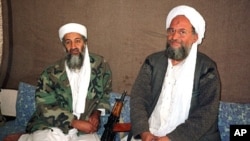Osama bin Laden's second-in-command, Ayman al-Zawahri, is being tipped as a likely successor to the slain al-Qaida chief. Whoever might lead the network would be hard pressed to fill bin Laden's role.
Bin Laden's death has led to speculation about who, if anyone, will take control of al-Qaida. Often mentioned is the Egyptian Islamist Ayman al-Zawahri, a frequent spokesman for the group who stressed his closeness to the late leader.
Voice of rhetoric
In an audio address released in February, al-Zawahri noted that bin Laden assigned him to advise Mujahideen on Islamic Sharia law.
Al-Zawahri has also been the voice of some of the group's more inflammatory rhetoric against the United States. Perhaps most importantly, he is considered by many to be the brains of the terror network, responsible for the planning of the group's most notorious acts, including the 2001 attacks in the United States.
Mohamed Salah, a political analyst and editor of the London-based al Hayat newspaper, says al-Zawahri is the real founder of al-Qaida, with his experience organizing Islamists in Egypt as important, if not more, than the ideological and financial leadership provided bin Laden.
Trained surgeon
A surgeon by profession, al-Zawahri, like bin Laden, gave up a life of privilege to violently promote a puritanical Islamic ideal. They met in the fight against Soviet troops in Afghanistan, but his roots in radical ideology stretch back to his teen years.
A fellow Islamist who shared an Egyptian prison cell with al-Zawahiri in the early 1980's, remembers him as a modest, poetry-reciting "gentleman," a surprisingly common description of terror leaders.
Assem Abdel Maged says outward demeanor could be misleading. Abdel Maged adds that in spite of his politeness and docility, al-Zawahiri is rigid, someone who one cannot oppose or face to change his views.
Sheikh Abdel Maged, a senior member of Jemaah Islamiyah, says the Islamic Group has advised al-Zawahri to follow its example and abandon violence. But the sheikh argues that as long as the reasons that provoked al Qaida remain - what he sees as American arrogance and support of Israel - so too will the group. All the same, in recent years, al-Qaida has been forced to undergo change. Part can be attributed to its leaders being forced underground.
Whereabouts unkown
Al-Zawahri's location remains unknown. But the movement has also become more diffuse, with affiliates often eclipsing bin Laden's group.
Anwar al-Awlaki, of al-Qaida in the Arabian Peninsula, for example, has emerged as a powerful force, his charisma a stark contrast to the dour, scolding image al-Zawahri projects. Sheikh Abdel Maged believes some day this younger generation may come to the fore.
For now though, he believes al-Zawahri is the only candidate to succeed bin Laden. But some terror experts question whether al-Qaida even needs a leader. For one thing, they argue, bin Laden will remain a powerful even iconic symbol, long after his death. Sheikh Abdel Maged agrees that the organization has moved far beyond its hierarchical origins.
Abdel Maged says al-Qaida is not a pyramid, rather it's an idea that lives in space, cyberspace in particular, nourished by American acts. And it could be the American act of killing bin Laden will give his supporters scattered around the world more reason to carry on, no matter who might step in to succeed him.
Al-Zawahri Likely bin Laden's Heir Apparent




